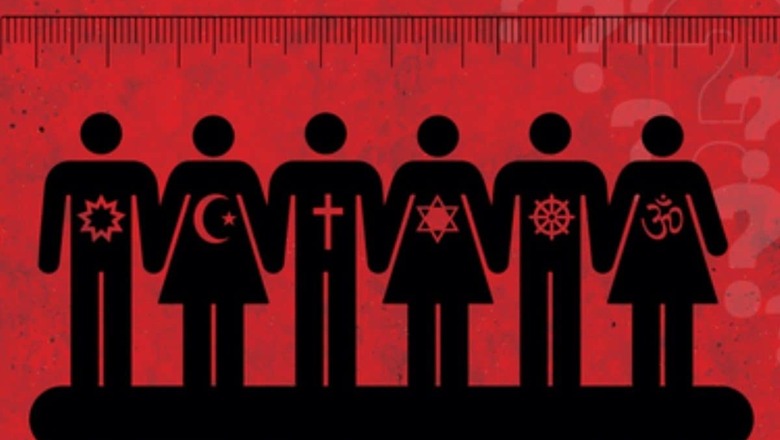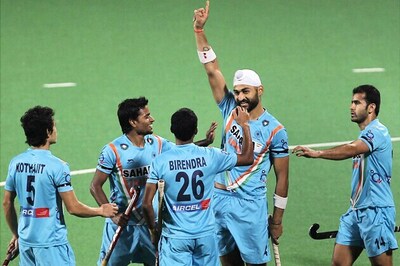
views
The well-known generic division of laws into Civil laws and Criminal laws is both fundamental and ancient. Both Civil laws and Criminal laws have their respective substantive and procedural parts.
Articles 36 to 51 under Part IV of Indian Constitution are the Directive Principles of State Policy. Article 37 made it clear that none of the said provisions would be enforceable by any court meaning thereby that no court will examine any of these Articles on any complaint made thereon. In legal terminology the provisions are therefore said to be non-justiciable. Article 37 however provides that the principles enumerated in other 15 Articles are fundamental in the governance of the country and it shall be the duty of the State to apply those principles in making laws. The Constituent Assembly debated on Article 29 (which is now Article 37) on 19 November 1948 only on the issue as to whether the Articles under Directive Principles should be made mandatory by casting obligations on the State so that instead of the provisions remaining only “pious wishes” they became enforceable in courts of law e.g. justiciable, but the House negating all amendments proposed to make them mandatory retained the Article as drawn.
These Articles under Part IV of Constitution have been regarded as the soul of Indian welfare state. The policy set out in Article 37 has never been debated subsequently by any till date as all concerned after adoption of constitution on 26 November 1949 accepted all the directions as egalitarian and very much beneficial to the people to be governed by the constitutional provisions.
And the State also has already acted upon and implemented some of these directions some examples of which, though belated, are that a number of states (i) have organised village panchayats (Article 40) in their respective state over time and first of which was organised by the State of Rajasthan in 1959 although full Constitutional provisions casting obligation on the states to constitute panchayats at different levels could be had only in 1992 by 73rd Constitution Amendment Act. (ii) The centre has enacted The Legal Services Authorities Act, 1987 to provide free legal aid to the “deserving” defined by Act (Article 39A). The directions cast upon the State by some other articles under part IV of Constitution have also been either fully or partly acted upon and implemented by the State and the nation has been reaping benefits thereunder.
The direction contained in Article 44 in its original draft has also been subject matter of almost continuous serious debate since its formulation by the members of Drafting Committee on its retention and thereafter on advisability of implementation but never on its desirability. All the said debates centred substantially around two issues, namely, (i) on its necessity and (ii) on plausibility of its implementation. The said two issues may not also hinge on the multi religious and multi communal ‘nation’s actual need’ for a Uniform Civil Code. Neither the Parliament at the centre nor any of the state Legislature ever felt that a UCC was unavoidably essential and necessary for overall effective governance at any point of time during the post independence period till date.
On deliberations of Article 35 of the draft constitution (which is now Article 44 of Constitution) there was a very clear division between Hindu and Muslim members within the drafting committee. None from any other minority communities like Christians did participate in the said deliberations either because there was no representation from their community on the drafting committee or none from them thought it fit to participate in the said deliberations. Muslim members expressing their traditional apprehension against Hindu majoritarianism had argued against Article 35 on the ground that each community had certain ‘religious laws’, certain ‘civil laws inseparably connected with their religious beliefs and practices’.
Further submissions of the Muslim members were that (i) in a secular state citizens belonging to different communities must have the freedom to practise their own religion, observe their own life and their personal laws should be applied to them and secular state did not mean that it was anti-religious; (ii) by one stroke of pen by an Article one could not revolutionise the whole country and if it was so done that would be tyrannical.
The Muslim members had also argued that their laws of succession, inheritance, marriage and divorce are completely dependent upon their religion and any uniform personal laws, if introduced, would lead to a considerable misunderstanding and resentment among various sections of the country and that was the stern reality and the goal towards a uniform civil code should be achieved, if at all, gradually and with the consent of the people concerned. It was the duty of the majority not to ride rough-shod over the rights of the minorities and any such attempt would be violative of religious freedom and accompanying rights guaranteed.
The Hindu members however cited examples of Europe, Turkey, Egypt and a host other countries who have followed the route of uniform civil code irrespective of religion and communities and therefore it could not doubtlessly be said that Muslim personal laws were completely and inextricably dependent on Islam. Examples of Turkey and Egypt were cited by them more particularly because of the fact that both the countries had Muslims in overwhelming majority and particularly Egypt’s state religion was Islam.
The Hindu members had also argued that in different European countries, there were Catholics, Protestants and Jews but different personal laws were not perpetuated in those countries. And they continued further that the differential systems of inheritance and other matters were some of the factors which contribute to the comparative differences among the peoples of different communities of India.
A uniform civil code was intended to weld different communities into a single nation by divorcing religion from personal laws eliminating those differences and in any event irrespective of Article 35 there was nothing to prevent future Parliament of India from passing such laws and certainly no Parliament, no Legislature would be unwise as to interfere with religious tenets of peoples and Muslims had read rather too much into Article 35.
What was not argued then was that Muslim community’s faith did not make any law of theirs so integral to their faith that they could never be divorced therefrom. In simple words their faith and laws were not intertwined. Ambedkar on that occasion had also said with examples that “we have in this country a uniform code of laws covering almost every aspect of human relationship”.
While in support of retention of Article 35. K M Munshi referred to a historical incident where the Kazi of Delhi objected to some of the reforms of Afghani Sultan Allaudin Khilji, who had ruled Delhi between 1296 to 1316 for long 20 years, when the Sultan had said in response that “I am as an ignorant man and I am ruling this country in its best interests. I am sure looking at my ignorance and of good intentions, the Almighty will forgive me, when he finds that I have not acted according to Shariat.”
The Muslim members canvassing their apprehensions had proposed as many as three amendments to Article 35 of draft Constitution (as were settled by the Vice President) and those were that: (i) “Provided that any group, section or community or people shall not be obliged to give up its own personal law in case it has such law” be added to Article 35; (ii) “Provided that the personal law of any community which is guaranteed by the statute shall not be changed except with the previous approval of the community ascertained in such manner as the Union Legislature may determine by law” be added to Article 35; and (iii) “That Part IV of draft Constitution be deleted”. All the three amendments so proposed were negated and finally Article 35 was retained as was drafted.
Like any other Article under Part IV of Indian Constitution Article 44 only directs that “the State shall endeavour to secure for all of its citizens a Uniform Civil Code (UCC) throughout territory of India.” But the most pertinent question of how and when however remained and still remains unanswered.
It is although not that explicit but all concerned indisputably understood that the direction meant and was only with regard to the ‘substantive’ part of civil laws. Substantive parts of civil laws may be divided under two heads i.e., personal civil laws and impersonal civil laws. The British brought uniformity in respect of some impersonal substantive civil laws like Indian Contract Act, 1872, Transfer of Property Act, 1882, The Sale of Goods Act, 1930 and such other civil laws. Uniformity was also brought by the British in procedural law applicable to civil proceedings by enacting Code of Civil Procedure, 1908. The word ‘code’ in the context means compilation. Uniform principles or law of evidence applicable to both civil and criminal proceedings were also introduced by the Indian Evidence Act, 1872.
Further uniformity was brought in the substantive Criminal Law by enacting Indian Penal Code, 1860. And in all those civil laws religions and/their diverse practices, if any, were not that intrinsically relevant and in any event they could be and were ‘divorced’ to determine personal relationships concerning those civil matters. It deserves to be mentioned that no community, religious or otherwise, ever could or did protest or oppose such divorce in any event as all those Acts were enacted by the ruling British Parliament in London for their Indian subjects. It is also to be noted that none of those civil laws however dealt with pure familial laws which are also known as personal laws which consist of laws of succession, inheritance, marriage and divorce.
The words ‘civil laws’ in Article 44 has also been both indisputably and consistently judicially replaced by narrower words ‘personal laws’ in the judgments of the Supreme Court. Personal laws of various communities were found to be discriminatory and had created gender inequality in application and treatment between men and women and in many areas they were found to be so pronounced that they assumed inhumane, if not barbaric, character in the context of modern egalitarian concept of civilisation and its wide perspective.
Although in the post constitution period on very many occasions and at very many fora the need of implementation of the provisions of Article 44 had been stressed upon but all remained inconclusive and ineffective on one ground or the other.
Even 21st Law Commission of India (2015 to 2018) having on its agenda the issue of UCC issued only a consultation paper expressing its anxiety in the matter of its implementation primarily on the ground that Indian citizens were not ready for it and second that implementation was likely to result in more discords amongst various communities and tribals than deriving its intended benefit for them.
K T Shah while debating in the Constituent Assembly had said “there will always be a way. It is either bankruptcy of intelligence if you say that you cannot find a way; or it is really a genuine lack of desire”.
The Supreme Court as late as in 1996 in Pannalal Bansilal Patil vs State of Andhra Pradesh (AIR 1996 SC 1023) although had observed that a uniform law is highly desirable but enactment thereof in one go perhaps might be counter productive to unity and integrity of the nation. The implication of such observation was that implementation might not be in one go but if it was in more than one go it might not be counterproductive. Its emphasis was only on the words ‘in one go’. It also needs to be pointed out that the drafting committee consciously chose the grammatical article ‘a’ before the expression Uniform Civil Code. It could also be argued therefore that we could not have more than one UCC.
It is trite and also we have quite rich experience that judiciary’s judicial wisdom, how laudable it might be, may not always synchronise with legislative and/or executive wisdom which are mostly motivated by political considerations of the party or parties forming the government where vote politics assume major role and political parties are led more by politicians and less by genuine statesmen. Moreover, Article 44 does not ‘mandate’ them to enact and implement a UCC although in some observations of Supreme Court Judges unfortunately the word ‘mandate’ has been used {e.g. Kuldip Singh J in Sarla Mudgal vs Kalyani (1995) 3 Supreme Court Cases 635}. The framers of constitution as aforesaid did not mandate implementation of the provisions of Article 44 notwithstanding very strong arguments in favour of making it so. A ‘direction’ also can never be read as a mandate in law. The Supreme Court itself has repeatedly said that courts should not undertake any exercise of review for any alleged ‘breach’ of any ‘policy’ set either by the legislature or by the executive. In law a policy may be highly desirable but a policy being inchoate is unbreachable i.e., no policy can also be subjected to judicial scrutiny. At the most a policy may breed an expectation only. The directive principles of State policy are only cluster of policies set as guidelines for future governance. None of the Articles under Chapter IV including Article 44 advisedly also did not fix any target time for a UCC. The court therefore could not also say so firmly that there was no justification whatsoever in delaying indefinitely the introduction of a uniform “personal laws” in the country. The Supreme Court in 1985 however somewhat sadistically observed that there was no evidence of any official activity for framing “Common Civil Code” for the country (Shah Bano’s case of 1985).
The Supreme Court consciously used the expression “Common Civil Code” to mean Uniform Civil Code. The Supreme Court therefore found no difference between the words “uniform” and “common”. According to the court both meant the same thing. Those who opposed the need of Article 35 in the draft Constitution at the deliberation taking place on 23rd November, 1948 were however of the view that the word “uniform” had a different connotation than that of the word “common” and very recently the distinguished jurist Tahir Mahmood has also in one of his articles on the subject made a distinction or differentiation between the two words saying that Article 44 speaks of a “uniform” and not a “common” civil code. The fine distinction, if any, does not deserve much attention of ours as both dictionary and general views on these two words lean in favour of the same meaning.
As British had brought uniformity in some civil and criminal laws so also in post independence period many new laws of general application like Special Marriage Act 1954, Dowry Prohibition Act 1961, Foreign Marriage Act 1969, maintenance law under Criminal Procedure Code 1973, Protection of Women from Domestic Violence Act 2005, Prohibition of Child Marriage Act 2006 and Maintenance of Welfare of Parents and Senior Citizens Act 2007 overriding contrary provisions of all personal laws in the respective fields have brought about uniformity in some of the personal laws, so the introduction of Uniform Civil Laws cannot now be said to be a revolutionising process but it indeed has been a long ongoing process. The process still needs uniformity in family laws e.g., succession, inheritance, marriage and divorce irrespective of patriarchal or matriarchal society. In India however, the majority of the communities belong to patriarchal society.
The rationale of a UCC is said to be to make family laws of the country free from all religion based discrimination and gender inequality and sooner India forgets its isolationist outlook on life, it is better for the country and further that UCC is therefore out and out an egalitarian provision to bring in equality and equal treatment between men and women of the entire country to make it a gender unbiased society.
As said earlier, the desirability of UCC has never been questioned. Those opposing UCC only claimed and still claim that UCC would cause dissatisfaction and disintegration than serve as a common umbrella to promote homogeneity and national solidarity and those sentiments and emotions of all communities need to be cooled and tempered and only then UCC could concretize when social climate is properly built up by the elite of the society, statesmen amongst leaders who instead of gaining personal mileage rise above and awaken the masses to accept the change.
In 1954, in Parliament, Jawarlal Nehru had also opined that “at the present moment the time is not ripe in India for me to try to push it through.” Nehru’s said view may not be valid in 2023 after a long lapse of 69 years. The communities in India through the passage of time can definitely be expected to have become more mature in their thinking and attitudes towards life, living and their faiths and their power of mutual tolerance, fellow filling and understanding. The more fundamental question seems to be, does the nation need uniformity in personal laws after almost three quarters of a century that the nation has passed since independence, particularly, when there has been no serious upheaval of discomfort in following and implementing diverse personal laws for diverse communities for so long?
It is also said that Indians cannot have a UCC because of different traditions and have different conceptions of marriage e.g. a sacrament for Hindus, whereas a contract for Muslims. The 2018 Law Commission recommended that all codes be internally reformed to make them more gender equal and then it may be easier to secure consensus.
It is also contended that how religious diversity is protected if Parliament is overwhelmingly dominated by Hindus and therefore Parliament is not representative enough of particular communities and that may lead an egalitarian project hostage to majoritarianism. But it is also equally true that in a country which is dominated more by a single community Parliament can never be representative enough ever in any situation even if provisions for separate representation for each community is made or allowed.
Secularism can and is therefore the best protection for each and all communities. As diversity is reflected in recognition of only 22 official languages, 398 dialects and 645 tribes complexities and complications involved for bringing in a UCC needs therefore a true secular outlook and resolution of those complexities and complications with required collective wisdom, prudence and effective unbiased administrative faculty but those complexities, complications and apprehension of sentimental and emotional upheaval need not deter the State from meeting the challenge indefinitely. There is no charm in showing stoic obedience to ‘status quo’ on a vital issue pending resolution since adoption of the Constitution by the nation.
On the other hand, it is also argued that to check misuse many Islamic countries have codified personal law wherein the practice of polygamy has been either totally prohibited or severely restricted as in Syria, Tunisia, Morocco, Pakistan, Iran and the Islamic Republics of Soviet Union as religious practices violative of human rights and dignity and sacerdotal suffocation of essentially civil and material freedom are not autonomy but oppression. A unified code is therefore imperative both for protection of the oppressed and promotion of national unity [R.M. Sahai J in Sarla Mudgal vs Union (1995) 3 sec 635].
The court in Shah Bano Begum’s case (1985) also had said that “piecemeal attempts of courts to bridge the gap between personal laws cannot take the place of a common civil code. Justice to all is a far more satisfactory way of dispensing justice than justice from case to case”. Further it was said that, “The present case is yet another which focuses … on the immediate and compulsive need for a uniform civil code.”
As a UCC was not pushed through since its adoption of the Constitution by any of the government the judicial free minds could and did also express their displeasure, if not anguish, while dealing with matters of ex facie ill treatment of weaker sex of communities on the basis of irrational and inhumane religious dictas which have no connection or no significant connection with pure religious faith.
While dealing with a prayer for divorce on the ground of nullity because of husband’s impotency the Supreme Court had in 1985 said that because of impotency the marriage had irretrievably broken down and also said that the law relating to judicial separation, divorce and nullity of marriage is far, far from uniform and time had come for a complete reform of the law of marriage and make a uniform law applicable to all people irrespective of religion or caste. {Ms. Jorden Diengdeh vs S. S. Chopra (1985) 3 SCC 62}. It also said “we suggest that time has come for intervention of legislature in these matters to provide uniform code of marriage and divorce and to provide by law for a way out of unhappy situations …..”. In the case of Mohd. Ahmed Khan vs Shah Bano Begum {(1985) 2 SCC 556} while dealing with the question of providing maintenance for divorced wife who was unable to maintain herself the Supreme Court not only interpreted Section 125 of Criminal Procedure Code 1973 in favour of the unfortunate divorced wife casting an obligation on her husband to maintain her but also had observed that “It is also a matter of regret that Article 44 of our Constitution has remained a dead letter …. There is no evidence of any official activity for framing a common civil code for the country …. A common civil code will help the cause of national integration by removing disparate royalties to laws which have conflicting ideologies …. It is the state which is charged with the duty of securing a uniform civil code for the citizens of the country and unquestionably, it has the legislative competence to do so”.
The court had also derived much inspiration from what Tahir Mahmood had said in his book “Muslim Personal Law” (1977) pleading that in pursuance of the goal of secularism, the State must stop administering religion based personal laws.
Article 19 to 23A of the draft Constitution, which are now Articles 25 to 30 providing right to freedom of religion and cultural and educational rights including freedom to manage religions affairs, were deliberated between 3rd to 8th December, 1948 when most of the deliberations held were on the expression “propagate” appearing in Article 19. Some desired its omission but such desire was negated. K M Munshi on that occasion had argued that “So long as religion is religion, conversion by free exercise of the conscience has to be recognised “. Much later in 1977 the Supreme Court said that right to propagate does not include right to convert, what is guaranteed is “freedom of religion” and not “freedom of conversion” (Article 19(1)(a) and Article 25) (Rev. Stainislaus vs State of MP).
The Supreme Court in Sarla Mudgal vs Union of India {(1995), 3 SCC 635} said that article 44 is based on the concept that there is no necessary connection between religion and personal law in a civilised society. Article 25 guarantees religious freedom whereas Article 44 seeks to divest religion from social relations and personal law. Marriage, succession and like matters of a secular character cannot be brought without the guarantee enshrined under Articles 25, 26 and 27. Therefore there appears to be no conflict between the provisions of Article 25, 26 and 27 and introduction of a UCC as was apprehended.
As against Muslim’s opposition Hindus cite that Hindu personal laws were profoundly reformed in 1955-56 despite violent opposition of Hindu religious leaders to show as evidence of sacrifice on the part of the Hindu Community and therefore similar jesture was also expected from all other communities and more particularly from the Muslim community which constitutes the largest minority in the country.
As aforesaid as absence of the provision of Article 44 in the Constitution could not also prevent the Parliament from legislating uniform civil law divesting religion therefrom at any point of time. What is expected of a secular democratic government is egalitarian reforms in each and all spheres of life of all its citizens irrespective of religion, caste and sex with least conflict in social fabric for which what is required is absolute secular wisdom of the members of the executive and the legislature.
Advisedly the framers of the constitution had placed marriages and divorce; infants and minors; adoption; wills, intestacy and succession, joint family and partition under concurrent list of 7th Schedule (serial no. 5) to the Constitution to enable both the Centre and States to do the needful as and when they would think best and proper. As there could be scope for conflict between laws enacted by one state with another’s enactment, it is therefore more than desirable and advisable that the Central Government effects the needful in one go.
It is however to be remembered that no legislature can be expected to be endowed with such legislative competence with the commensurate drafting craft to meet the challenges to make a perfect law in one go to stand the test of time either. Passage of time and emergence of new social problems from time to time are likely to make them learn, relearn and unlearn and act to meet the ever growing new challenges.
K T Shah on 19th November, 1948 had argued that could any authority commended with the drafting of this constitution approve of such a provision being incorporated in the Negotiable Instruments Act authorising making of a cheque payable when able? Complexities and complications involved in the matter of legislating a UCC, as said earlier, should also not deter the Parliament for indefinite period from legislating very much desirable egalitarian legislation for the whole nation to save the country from being disparaged from the point of view of pan world modern civilisation.
Apprehended complexities and complications may not also be insurmountable as there will always be a way if the Parliament has a genuine desire. Unwavering respectful obedience to ‘status quo’ is also not an all-time virtue for a progressive state and its society.
The author is former Advocate General of West Bengal. Views expressed in the above piece are personal and solely that of the author. They do not necessarily reflect News18’s views.



















Comments
0 comment